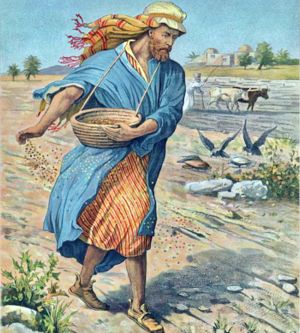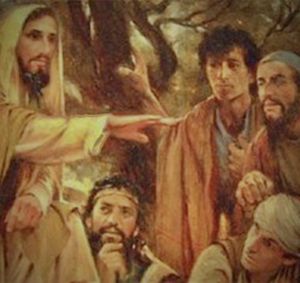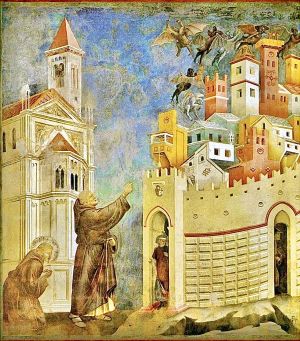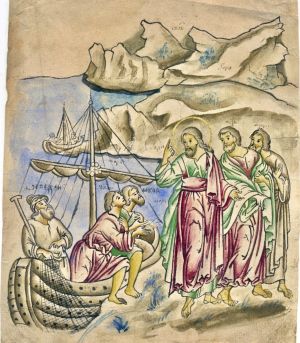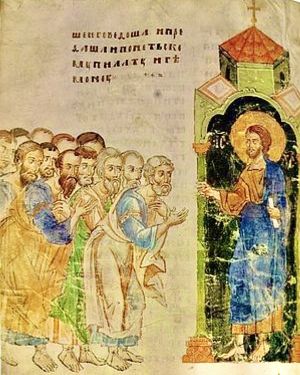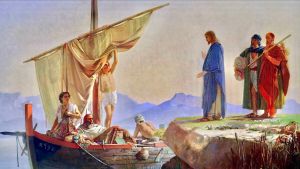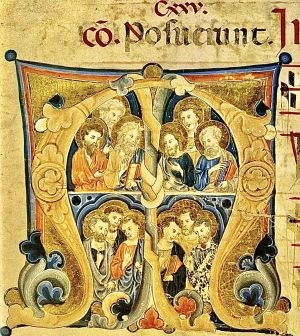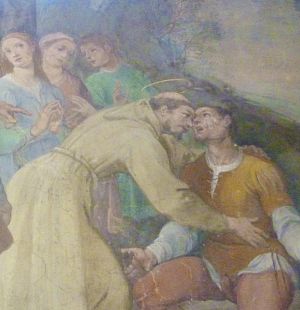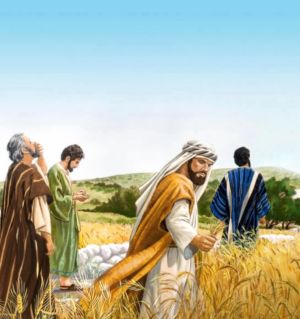
Teresa Girolami
Teresa Girolami è laureata in Materie letterarie e Teologia. Ha pubblicato vari testi, fra cui: "Pellegrinaggio del cuore" (Ed. Piemme); "I Fiammiferi di Maria - La Madre di Dio in prosa e poesia"; "Tenerezza Scalza - Natura di donna"; co-autrice di "Dialogo e Solstizio".
Sower and Soil
In the Parable of the Sower, Jesus emphasises the different reception and assimilation of the Word of God, and consequently the different fruit, depending on the suitability of the soil.
The new Evangelist of the latter time, Francis, was in love with the Word of God and listened to it constantly, so much so that it was imprinted in his memory.
It was good soil that produced one hundred per cent.
The Sources inform us:
"Irradiated by the splendours of the eternal Light, he scrutinised the depths of the Scriptures with a clear and acute intellect.
His intellect, pure from all stain, penetrated the secret of the mysteries [...].
He read from time to time the sacred books and kept tenaciously imprinted in his memory what he had once assimilated: for he continually ruminated with affectionate devotion what he had listened to with an attentive mind" (FF 1188).
"With equal care and devotion he committed himself to the other teachings he had heard.
For he had never been a deaf hearer of the Gospel, but, entrusting everything he heard to a commendable memory, he sought with all diligence to carry it out to the letter' (FF 357).
As Celano calls him, in the Vita prima - "river of Paradise" - Francis, "the new evangelist of this last age spread the waters of the Gospel with loving care throughout the whole world, and by his works he pointed out the way and the true doctrine of the Son of God" (FF 475).
In the Regola non bollata (1221):
"Let us therefore hold fast to the words, life, doctrine and Holy Gospel of Him who deigned to pray for us to the Father" (FF 62).
And "let us beware of being the ground along the road, or the stony ground, or the ground overrun with thorns according to what the Lord says in the Gospel:
«The seed is the Word of God [...] the seed entrusted to the good soil, are those who, hearing the word with good, indeed excellent dispositions, understand and guard it and bear fruit with perseverance»" (FF 58).
The little Poor was, for his time, a concrete and fruitful incarnation of the Gospel.
«And other seeds fell on the good earth and bore fruit by rising and growing and bearing one thirty and one sixty and one hundred» (Mk 4:8)
Wednesday 3rd wk. in O.T. (Mk 4,1-20)
Will of God, the watershed of spiritual kinship
With an astonishing twist of hand, Jesus explains who his mother and brothers are: those who embody the will of God.
After their conversion, Francis and Clare always sought God's will by looking to Mary, the handmaid of the Lord, the one who had found favour with the Almighty by becoming the Mother of Jesus.
Francis, from the very beginning of his vocation-mission paid special and devoted attention to the Virgin.
The Sources make us aware of his extraordinary love for Her, summed up by a hieratic antiphon of the Poverello:
"Holy Virgin Mary, there is none like thee, born in the world, among women, daughter and handmaid of the most high King the heavenly Father, mother of our most holy Lord Jesus Christ, spouse of the Holy Spirit; pray for us with Saint Michael the Archangel and with all the powers of heaven and with all the saints, to thy most holy beloved Son, Lord and Master" (FF 281).
Francis 'surrounded the Mother of Jesus with an unspeakable love, because she had made the Lord of majesty our brother' (FF 786).
But Clare herself was considered 'altera Maria' when she arrived at the Portiuncula, where Francis and the brothers awaited her for her total dedication to God:
"After she had taken the insignia of holy penance before the altar of St. Mary and, as if before the nuptial thalamus of the Virgin, the humble handmaiden had been married to Christ, immediately St. Francis led her to the church of St. Paul*, with the intention that she should remain there until the Will of the Most High disposed otherwise" (FF 3172).
Like Mary, Clare pronounced her "Fiat" to the will of the Father.
Oh how they both loved the will of God!
Forgetting themselves, they adhered to the divine plan for them, each in their own time, each in their own groove.
In the Sources again:
"In the same way, then, that the glorious Virgin of virgins bore Christ materially in her womb, you too, following his vestiges, especially of his humility and poverty, can always, without any doubt, bear him spiritually in your chaste and virginal body.
And you will contain in you Him by whom you and all creatures are contained, and you will possess that which is the most lasting and definitive good even in comparison with all the other transient possessions of this world" (FF 2893 - Letter three to Blessed Agnes of Prague).
Francis and Clare, following the example of the humble Mary of Nazareth, loved God's will for them in a sunny and lasting way.
In fact, in a concluding prayer of Francis, we contemplate his constant yearning to seek it and indulge it with abandon.
"Almighty, eternal, just and merciful God, grant to us miserable people to do, by the power of your love, what we know you want, and to always want what pleases you, so that, inwardly purified, inwardly enlightened and kindled by the fire of the Holy Spirit we may follow in the footsteps of your beloved Son, our Lord Jesus Christ, and, with the help of your grace alone, come to you, O Most High, who in perfect Trinity and simple Unity live and reign glorious, Almighty God for ever and ever. Amen" (FF 234 - Letter to the whole Order).
«And answering, he says to them: Who is my mother and brothers? [Whoever does the will of God is my brother and sister and mother» (Mk 3:33, 35)
*The church and the Benedictine monastery of San Paolo delle Abbadesse, where Clare was led after her consecration in the Portiuncula, stood near Bastìa Umbra, 4 km from Assisi.
Tuesday 3rd wk. in O.T. (Mk 3,31-35)
«If a kingdom is divided against itself, that kingdom cannot stand»
The evangelist Mark pays attention to the blasphemous statement of the scribes who see in Jesus a man possessed by Beelzebubl, prince of demons. But the Lord displaces them with unassailable answers.
The 'jester of God', precisely because he loved Him, was much persecuted and had strenuous struggles with those who point their fingers at God day and night against their brothers.
The Sources tell of various circumstances in which the servant of God had to suffer for his sake, defending himself with continuous and profound prayer, which transferred the Holy Spirit into his soul.
"He arrived one day in Arezzo, while the whole city was shaken by civil war and threatened with imminent ruin. The servant of God was lodged in the village outside the city, and saw over it exultant demons, who were stirring up the citizens to destroy each other. He called Brother Sylvester, a man of God and remarkable simplicity, and commanded him:
"Go to the gate of the city, and by Almighty God command the demons that as soon as possible they leave the city".
The pious and simple friar hastened to obey, and after addressing God with a hymn of praise, he cried out before the gate in a loud voice:
"From God and by order of our father Francis, go away from here, all you demons!".
The city soon afterwards found peace and the citizens respected each other's civil rights with great tranquillity.
Later, speaking to them, Francis, at the beginning of his preaching, said:
"I speak to you as people once subjugated and enslaved by demons. But I know that you have been set free through the prayers of a poor man'" (FF 695).
«If a kingdom is divided against itself, that kingdom cannot stand» (Mk 3:24).
Clare of Assisi also had to fight several times.
In the Legend we find:
"Between the Hours of the Day, at the Sixth and at the Ninth, she is usually seized with greater compunction, wanting to immolate herself with the immolated Lord.
So it happened once that, while she was praying in her little cell at the Ninth Hour, the devil struck her on the jaw and bloodshot one of her eyes, and he gilded one of her cheeks" (FF 3215).
These two great witnesses of the faith knew that evil is envious of the Good, but also that the latter takes ground from it inch by inch, since darkness cannot prevail over the Light.
Monday 3rd wk. in O.T. (Mk 3:22-30)
No fear of worldly judgement, for the Kingdom
Jesus is Light in his preaching, and walking along the Sea of Galilee, he draws the sons of Zebedee to follow him, as well as Simon and Andrew, the fishermen.
Francis understood that the words of the Crucifix of San Damiano did not refer to the reconstruction of the small temple, but to the renewal of the Church in its members.
He had laid aside his penitential garments to take on the 'minorite' habit, girding his loins with a rough rope and covering his head with the hood worn by the peasants of the time, walking barefoot.
He had begun his apostolic mission by marrying Lady Poverty to become, as Jesus suggested, a fisher of men in the faith.
The Sources, in a transversal way, provide significant snapshots of this becoming a 'fisherman' in the proclamation of the Word of salvation.
In fact, we read in his address to the friars:
«Dear brothers, let us consider our vocation. God, in his mercy, has called us not only for our own salvation, but also for that of many others.
Let us therefore go throughout the world, exhorting everyone, by example rather than words, to do penance for their sins and to remember God's commandments».
He continued:
«Do not be afraid of being considered insignificant or unbalanced, but proclaim penance with courage and simplicity. Trust in the Lord, who has conquered the world!» (FF 1440).
Francis had cast his nets into the sea of society at that time to bring souls to God, and he taught his friars to do the same.
The latter "walked joyfully, speaking among themselves the words of the Lord, saying nothing that did not serve the praise and glory of God and the profit of the soul.
They frequently gave themselves over to prayer. The Lord took care of preparing hospitality for them and ensured that they were served with what was necessary" (FF 1455).
Amazement accompanied them, in their purity of spirit, for the souls they led to God - happy that the unloved Love (as Francis said) was becoming better known through the Proclamation.
And again in the Sources:
"Many people, seeing the friars serene in tribulations, cheerful and devoted in prayer, having neither money nor receiving money, cultivating brotherly love among themselves, from which it was recognised that they were truly disciples of the Lord, were impressed and sorry, and came to them and asked forgiveness for the offences they had committed.
They forgave them wholeheartedly, saying, «May the Lord forgive you!» - and gave them useful advice for their salvation.
Some begged to be received into their group [...] so they took with them some aspirants to the religious life and, in their company, they all returned, at the appointed time, to Santa Maria della Porziuncola" (FF 1445).
Because those who choose God have their choice imprinted on their hearts and faces.
«Come after me, and I will make you fishers of men» (Mt 4:19)
3.a Domenica T.O. (A) (Mt 4,12-23)
Christ’s the fool, God's jester
The evangelist Mk portrays Jesus surrounded by crowds, so much so that he had no time even for himself. And his own go to pick him up, considering him "out of his mind".
Francis of Assisi was often considered 'the fool' of Christ.
His living the Gospel 'sine glossa' was incomprehensible to many.
On the other hand, he himself considered himself crazy for the Lord.
"Many made fun of him, persuaded that he had given them the run-around; others were pitied to the point of tears, seeing that young man pass so quickly from a life of pleasures and whims to an existence transfigured by the intoxication of divine love.
But he, heedless of ridicule, gave fervent thanks to God.
How much he struggled in those restorations would be long and difficult to recount.
Used to every delicacy in his father's house, here he was now carrying stones on his shoulders, suffering many sacrifices to serve God" (FF 1421).
The spirit of prophecy shone in Francis, but when he exposed himself, it happened that he was taken for a fool, because the wisdom of the poor was despised, while the heart of the righteous proclaimed true things.
"When the Christian army was besieging Damiata, the man of God was also there, armed not with weapons but with faith.
The 'day of battle' came when the Christians had decided to storm the city.
When he heard this decision, the servant of Christ, coming out in loud laments, said to his companion:
"If the assault is attempted, the Lord has revealed to me that it will not go well for the Christians. But if I say this, they will think me a fool; if I keep silent, I cannot escape the reproach of conscience. So: what seems best to you?"
His companion answered him: "Brother, do not worry at all about people's judgement: it is not the first time you have been judged mad. Free your conscience and fear God more than men".
At these words, the herald of Christ confronts the crusaders, full of impetus, and, concerned to save himself from danger, tries to prevent the attack, foretells defeat.
But the truth is taken for a fable: they hardened their hearts and would not convert [...].
The ranks of Christians returned decimated by a terrible slaughter: about six thousand dead and prisoners' (FF 1190).
«And he came to the House; and again the crowd gathered, so that they could not even eat bread. And when they had heard, they [those around him] went out to get him, because they said: He is outside himself» (Mk 3:20-21)
Saturday 2nd wk. in O.T. (Mk 3,20-21)
«Come behind me, and I will make you fishers of men»
Vocation attracting other disciples
Mk depicts Jesus ascending the mountain and in solitude-prayer calling the Twelve to follow him.
Francis' vocation to follow Christ was a call and attraction of other sequels. His assiduous prayer encouraged many souls to share the evangelical ideal.
Francis desired to have brothers who would «stay with him and to send them out to preach» (Mk 3:14).
In the Sources there are numerous episodes that portray the call of many future brothers and souls willing to follow Clare of Assisi.
We read:
"Some began to feel called to penance by his example and to join him, in habit and life, leaving everything behind.
The first of them was the "venerable Bernard", who, having been made a partaker of the divine vocation, deserved to be the firstborn of the blessed father, first in time and holiness.
Bernard, having ascertained by himself the holiness of Christ's servant, decided to follow his example, abandoning the world completely.
Therefore he turned to him, to know how to realise this intention" (FF 1053).
And to his brothers, he often repeated:
«This is our vocation: to heal wounds, to bind up fractures, to call the lost back.
Many, who seem to us to be members of the devil, may one day become disciples of Christ» (FF1470).
In the legend of St Clare:
"Placing her nest, like a silver dove, in the hollows of this cliff, she generated a host of virgins of Christ, founded a holy monastery and started the Order of the Poor Ladies" (FF3176).
"The fame of the sanctity of the virgin Clare soon spread through the neighbouring districts, and women flocked from all sides after the fragrance of her perfume.
The virgins, following her example, hasten to keep themselves as such for Christ; the married ones study to live more chastely [...].
Countless virgins, spurred on by the fame of Clare, having some impediment to embrace the cloistered life in a monastery, study to live in their father's house, though without a rule, according to the spirit of the rule.
Such were the seeds of salvation born by the example of the virgin Clare, that it seemed to be fulfilled in her the saying of the prophet: more numerous are the sons of the abandoned than of the one who has a husband" (FF 3177).
«And he went up on the mountain and called those whom he wanted, and they came to him» (Mk 3:13)
Friday, 2nd wk. in O.T. (Mk 3,13-19)
Precarious dimension, shared humanity
In today's Gospel Jesus, surrounded by a large crowd, heals many, and the unclean spirits call him by his Name: "You are the Son of God".
(Mk 3:11).
The Sources tell us that Francis, in his Letter to the whole Order, expresses himself thus:
«Brother Francis, a small and frail man, your little servant, wishes health in Him who has redeemed us and washed us in His most precious blood.
Hearing His name, adore Him with fear and reverence, leaning towards the earth: Lord Jesus Christ, Son of the Most High is His name, blessed for ever» (FF 215).
The Poverello always presents Jesus as the One who has nowhere to stand. In fact, even in today's passage, Christ, because of the crowd, asks the disciples to keep a boat ready for him so that he will not be crushed.
Jesus shows the precarious dimension of his living in all circumstances.
In love with poverty, Francis addresses his brothers with the expression from the Gospel:
«The foxes have their dens and the birds of the air have their nests; but the Son of Man has nowhere to lay his head [...]».
"[Thus] he taught the brothers to build poor huts [...] to live in them not as their own houses, but as in the houses of others, as pilgrims and strangers.
He said that the code of pilgrims is this:
«To gather under the roofs of others, to thirst for the homeland, to pass away in peace»" (FF1120).
And since he repeated that children of God are those who do his works, the Minim of Assisi distinguished himself as a child of God, and in the Spirit he performed many healings.
"People of all ages and sexes ran to see and hear that new man, given from heaven to the world.
He pilgrimaged through the various regions, fervently proclaiming the Gospel; and the Lord cooperated, confirming the Word with the miracles that accompanied it.
Indeed, in the name of the Lord, Francis, preacher of the truth, drove out demons, healed the sick, and, an even greater miracle, by the efficacy of his word he softened and moved the obstinate to penance and, at the same time, restored health to bodies and hearts" (FF 1212).
«For he cured many so that they rushed to him to touch him, as many as had infirmities» (Mk 3:10)
Thursday, 2nd wk. in O.T. (Mk 3:7-12)
Observance and Person
Today's Gospel highlights the hardness of heart of the Pharisees who were ready to accuse Jesus for healing a paralysed hand.
For them, observance comes before the person. And that is terrifying!
Francis, the Little One of Assisi, on the other hand, in the footsteps of Christ, put human health, both physical and inner, at the centre.
For him, the brother (or sister) to be healed came before all criteria.
Announcing salvation and implementing it was the first reason that governs the universe, and for this he was ready for anything.
In the Sources we find life stories that draw attention to Francis' compassion for those waiting to be healed.
"A little girl from Gubbio with shrunken hands had already lost the use of all her limbs for a year. The nurse, confident that she would be cured, took her to the tomb of St Francis, bringing with her a wax figure the size of the child*.
After eight days of waiting, the miracle comes true: the little infirm girl recovers the use of her limbs, so that she is deemed fit for her former chores" (FF 549).
"A woman from the town of Gubbio had both her hands shrunken and dry, so that she could not use them at all. As soon as the Saint made the sign of the cross to her in the name of the Lord, she was so perfectly healed that she immediately returned home and began to prepare food with her own hands, as Simon's mother-in-law once did, in the service of Francis and the poor" (FF 1217).
But the Saint, as mentioned above, was struck by the hardness of heart shown by some Romans, before the preaching of the Word.
In the Testimonies following the death of Francis
"But the Roman people [...] covered him with contempt, to such an extent that they not only did not want to listen to him, but also deserted his sermons. And for many days they continued to mock his preaching. Then Francis rebuked them for the hardness of their hearts, saying:
«I greatly pity you for your misery, because not only do you hold me, the Lord's servant, in contempt, but in me you bring shame on that Redeemer whose good news I proclaim to you [...]
I will go and proclaim Christ to the brute animals and to the birds of the air; they will hear these words of salvation and will obey God with all their hearts» (FF 2288).
* It was a fairly widespread devotional form in the Middle Ages, that of offering, as an ex voto, to obtain a grace, figures of wax, bread, metal, of the same weight or size as the supplicant.
Wednesday 2nd wk. in O.T. (Mk 3,1-6)
Human being is important, more than codes
The Sabbath was made for man and not man for the Sabbath, says the Lord. The priority is the person, not the law, which must be respected.
In Francis of Assisi, this truth is the basis of his path, the guiding motif of his exquisite actions.
Free from legalistic fetters, yet still in active obedience to the Word, in the face of the needs of the creature he was capable of going beyond appearances in his own way, which in reality consternated him in the impelling of the essential.
We need only recall one episode:
"Once he heard that a sick monk had a desire to eat some grapes.
He accompanied him to a vineyard and, sitting down under a vine, to infuse him with courage, he himself began to eat first" (FF 762).
In the same way Clare emphasised the same prerogatives, behaving as one who 'lorded' over the rules, because the Rule par excellence is the Lord's Charity.
And in the light of this she behaved accordingly with the poor Dames of St. Damian.
The Sources attest:
"The sisters [...] are still to observe continuous silence in church, in the dormitory and in the refectory only when they eat.
With the exception of the infirmary, where, for the relief and service of the sick, the sisters will always be allowed to speak in moderation.
They may, however, always and everywhere, communicate whatever is necessary, but briefly and in a whisper" (FF 2783).
«Sabbath was made for man and not man for the Sabbath» (Mk 2:27)
Tuesday 2nd wk. in O.T. (Mk 2,23-28)
Familiarity at the human level makes it difficult to go beyond this in order to be open to the divine dimension. That this son of a carpenter was the Son of God was hard for them to believe. Jesus actually takes as an example the experience of the prophets of Israel, who in their own homeland were an object of contempt, and identifies himself with them (Pope Benedict)
La familiarità sul piano umano rende difficile andare al di là e aprirsi alla dimensione divina. Che questo Figlio di un falegname sia Figlio di Dio è difficile crederlo per loro. Gesù stesso porta come esempio l’esperienza dei profeti d’Israele, che proprio nella loro patria erano stati oggetto di disprezzo, e si identifica con essi (Papa Benedetto)
These two episodes — a healing and a resurrection — share one core: faith. The message is clear, and it can be summed up in one question: do we believe that Jesus can heal us and can raise us from the dead? The entire Gospel is written in the light of this faith: Jesus is risen, He has conquered death, and by his victory we too will rise again. This faith, which for the first Christians was sure, can tarnish and become uncertain… (Pope Francis)
These two episodes — a healing and a resurrection — share one core: faith. The message is clear, and it can be summed up in one question: do we believe that Jesus can heal us and can raise us from the dead? The entire Gospel is written in the light of this faith: Jesus is risen, He has conquered death, and by his victory we too will rise again. This faith, which for the first Christians was sure, can tarnish and become uncertain… (Pope Francis)
The ability to be amazed at things around us promotes religious experience and makes the encounter with the Lord more fruitful. On the contrary, the inability to marvel makes us indifferent and widens the gap between the journey of faith and daily life (Pope Francis)
La capacità di stupirsi delle cose che ci circondano favorisce l’esperienza religiosa e rende fecondo l’incontro con il Signore. Al contrario, l’incapacità di stupirci rende indifferenti e allarga le distanze tra il cammino di fede e la vita di ogni giorno (Papa Francesco)
An ancient hermit says: “The Beatitudes are gifts of God and we must say a great ‘thank you’ to him for them and for the rewards that derive from them, namely the Kingdom of God in the century to come and consolation here; the fullness of every good and mercy on God’s part … once we have become images of Christ on earth” (Peter of Damascus) [Pope Benedict]
Afferma un antico eremita: «Le Beatitudini sono doni di Dio, e dobbiamo rendergli grandi grazie per esse e per le ricompense che ne derivano, cioè il Regno dei Cieli nel secolo futuro, la consolazione qui, la pienezza di ogni bene e misericordia da parte di Dio … una volta che si sia divenuti immagine del Cristo sulla terra» (Pietro di Damasco) [Papa Benedetto]
And quite often we too, beaten by the trials of life, have cried out to the Lord: “Why do you remain silent and do nothing for me?”. Especially when it seems we are sinking, because love or the project in which we had laid great hopes disappears (Pope Francis)
E tante volte anche noi, assaliti dalle prove della vita, abbiamo gridato al Signore: “Perché resti in silenzio e non fai nulla per me?”. Soprattutto quando ci sembra di affondare, perché l’amore o il progetto nel quale avevamo riposto grandi speranze svanisce (Papa Francesco)
The Kingdom of God grows here on earth, in the history of humanity, by virtue of an initial sowing, that is, of a foundation, which comes from God, and of a mysterious work of God himself (John Paul II)
duevie.art
don Giuseppe Nespeca
Tel. 333-1329741
Disclaimer
Questo blog non rappresenta una testata giornalistica in quanto viene aggiornato senza alcuna periodicità. Non può pertanto considerarsi un prodotto editoriale ai sensi della legge N°62 del 07/03/2001.
Le immagini sono tratte da internet, ma se il loro uso violasse diritti d'autore, lo si comunichi all'autore del blog che provvederà alla loro pronta rimozione.
L'autore dichiara di non essere responsabile dei commenti lasciati nei post. Eventuali commenti dei lettori, lesivi dell'immagine o dell'onorabilità di persone terze, il cui contenuto fosse ritenuto non idoneo alla pubblicazione verranno insindacabilmente rimossi.


